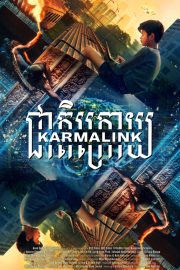Karmalink
“Karmalink” fuses fantasy, science-fiction and faith into a package I can definitely get behind. Genre is one of the best storytelling engines we have for issues of faith, and that is certainly the case in “Karmalink.” The film is not just about ideas, though- co-writer/director Jake Wachtel has some rich images to show us, as well, be they futuristic, or set in the past.
The film takes place in a town in Cambodia that is under siege in the name of “progress.” Government contractors are trying to get the locals to relocate so that new buildings, and a bullet train, can go up where these people live. That is not the main crux of the story, however; Leng Heng (Leng Heng Prak) is a young boy who is having visions of a man finding a golden Buddha statue in a sea of ceramic ones. This isn’t just a case of dreaming adventures to go on; Leng Heng is revisiting past lives lived. Throughout these images, he gets clues about how his lives have gone, and the search for the golden Buddha drives him. He enlists his friend, Srey Leak (Srey Leak Chhith)- a detective- to help find it.
The great mystery of life is what happens after it- does all we are just cease to exist? Are we born again, and if so, are we destined to live as we did earlier, or do we have a chance to change things? One of the fundamental lessons we come to learn in life is the idea of learning from mistakes, so that we can grow. What can Leng learn from these experiences? The film is, essentially, “The Goonies” in how it’s taking its young protagonists on an adventure to see whether they can save their town, but more than that, Leng Heng begins to lose sight of who he is after an encounter with a neuroscientist might be able to help them find what they’re looking for. As with “Inception” and “The Fountain,” though, the longer you stay in the past, the likelier you are to lose your sense of identity in it.
Wachtel’s film is just around the corner from modern society, which- in many cases- is a benefit for a story like this, and how it unfolds. The sci-fi elements are not far removed from what we are able to interact with now, even if their power is profoundly advanced in comparison. I’m all for visionary landscapes in science-fiction, but I think it’s very telling that a lot of sci-fi is staying close to how the world is now; after all, how many predictions for how life might be in the future have failed to come true? “Karmalink,” like films such as “2050” and “After Yang,” understand the world as it exists now, and would just like to nudge us in a better direction more than challenge us to achieve what isn’t possible right now. That sounds bleak, but honestly, it feels hopeful as we watch these films, because they’re doing what great science fiction does, and challenging the world as it is right now. “Karmalink” feels slight compared to those films, but it’s still a wonderful example of how sci-fi can make us think, and maybe enlighten us.










